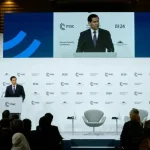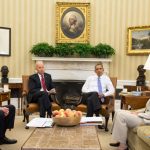Every Democrat in the Senate is backing a constitutional amendment that aims to overturn Citizens United v. Federal Election Commission, the 2010 decision in which the Supreme Court lifted legal restrictions on what corporations and unions are allowed to say about politics at election time. That would be troubling enough, since Citizens United, which involved a film that was banned from TV because it was too critical of Hillary Clinton, simply recognized that Americans do not lose their First Amendment rights when they organize themselves in a disfavored way. But the so-called Democracy for All Amendment goes much further than nullifying one Supreme Court decision. It would radically rewrite the constitutional treatment of political speech, allowing Congress and state legislatures to impose any restrictions on election-related spending they consider reasonable.
“To advance democratic self-government and political equality, and to protect the integrity of government and the electoral process,” Section 1 says, “Congress and the States may regulate and set reasonable limits on the raising and spending of money by candidates and others to influence elections.” By allowing restrictions on money spent by anyone to influence elections, that provision would nullify a principle set forth in the landmark 1976 case Buckley v. Valeo.
In Buckley, the Supreme Court upheld the Federal Election Campaign Act’s limits on campaign contributions, which it said were justified by the desire to prevent “corruption and the appearance of corruption.” But the Court overturned FECA’s limits on spending by candidates and on independent spending by individuals and groups. Those limits, the Court said, “place substantial and direct restrictions on the ability of candidates, citizens, and associations to engage in protected political expression, restrictions that the First Amendment cannot tolerate.”
The rationale for that conclusion is not, as critics often claim, that “money is speech.” The point, rather, is that people must spend money to communicate with large numbers of their fellow citizens. Limits on spending therefore restrict their ability to exercise their First Amendment rights. If the government banned computers and smartphones, that would clearly violate the First Amendment—not because computers and smartphones are speech but because they are necessary to participate in online debate.
The Democracy for All Amendment would ditch this understanding of the First Amendment and instead rely on legislators’ self-restraint in deciding which limits on spending are “reasonable.” Courts reviewing the resulting rules would have precious little guidance in deciding when they went too far.
Section 2 of the amendment adds that legislators “may distinguish between natural persons and corporations or other artificial entities created by law, including by prohibiting such entities from spending money to influence elections.” In other words, a complete ban on election-related speech by citizens organized as corporations, including a wide range of nonprofit interest groups across the political spectrum, would be presumptively reasonable, regardless of timing. By contrast, the ban overturned by Citizens United applied only to messages that mentioned a candidate for federal office within 30 days of a primary or 60 days of a general election.
The implication, perhaps, is that a complete ban on election-related spending by individuals or by groups not organized as corporations would not be constitutional. But how close legislators could get to that policy without violating the First Amendment is anybody’s guess.
“Every American deserves to have an equal voice at the ballot box, regardless of the size of their bank account,” says Sen. Tom Carper (D–Del.), a lead co-sponsor of the amendment. Chris Coons, the other Democratic senator from Delaware, likewise promises that the amendment will “give all Americans an equal voice in our elections.”
Carper and Coons are not saying that every American should get an equal vote. They are saying that every American should have an equal influence on the political debate, which is impossible but would seem to require, at the very least, that no one be allowed to spend more on election-related speech than the poorest American can afford. The Supreme Court has explicitly said that such equalization of speech is inconsistent with the First Amendment. As now-Justice Elena Kagan noted in a 1996 law review article, it is well-established that “the government may not restrict the speech of some to enhance the speech of others.”
The third section of the amendment contradicts the other two sections by stating that “nothing in this article shall be construed to grant Congress or the States the power to abridge the freedom of the press.” The amendment’s backers seem to think they are constitutionalizing the “media exemption” from limits like the ones overturned in Citizens United. Under that exception, news outlets such as The New York Times and CNN were free to talk about political candidates close to an election, even though they were organized as corporations.
As scholars such as UCLA law professor Eugene Volokh have shown, however, the “freedom of the press” protected by the First Amendment does not refer to a particular profession. The clause was meant to protect anyone who uses a technology of mass communication—the printing press at the time and, by extension, TV, radio, and the internet today. On its face, then, Section 3 of the Democracy for All Amendment invalidates the rest of it.
Even if it didn’t, what would stop interest groups from using their own media outlets (such as the ill-fated NRA-TV or The Daily Signal, published by the Heritage Foundation) as channels for their political speech, thereby qualifying for constitutional protection even under the Democrats’ sharply circumscribed, industry-specific freedom of the press? Presumably, legislators and judges would have to start drawing distinctions between “real” and “fake” media outlets, a judgment for which the Constitution provides no guidance.
Carper describes this license for censorship as “a straightforward constitutional amendment that will restore the health and integrity of our campaign finance system.” That’s true only if “health and integrity” require muting some voices so that others may be heard. But that goal is plainly at odds with freedom of speech and freedom of the press. While the amendment has zero chance of actually being adopted, the fact that the entire Senate Democratic Caucus thinks it’s a fine idea speaks volumes about the party’s disregard for those freedoms.
Story cited here.
























